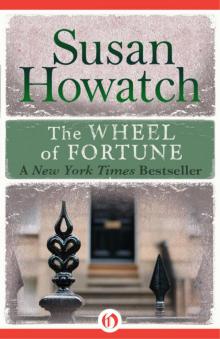- Home
- Susan Howatch
Ultimate Prizes Page 4
Ultimate Prizes Read online
Page 4
“How on earth did you do it?”
“I let him know who was the boss. Sometimes I think you’re too soft with him.”
“I’m not soft with him! I’m just a normal loving mother, and if you’d ever had a normal loving mother yourself—”
“My mother adored me.”
“Well, I suppose she did in her own peculiar way, but—”
“Grace, is this really the moment to start talking about my mother?”
“It’s never the moment to start talking about your mother!”
“Then why drag her into the conversation?”
“Oh, I’m sorry, I’m sorry, I’m sorry—” Once more Grace dissolved into tears.
Guilt smote me. “My dearest love … forgive me …” Sinking down on the bed I kissed her in despair but when the tears continued I announced: “I’m going to say my prayers,” and escaped to the dressing-room. For ten seconds I concentrated on breathing deeply. Then having steadied my nerves I stripped off my clothes, stood naked in the middle of the floor and stretched myself until my muscles ached. This manoeuvre also proved soothing. When I shed my clerical uniform I felt younger, more flexible, possibly more light-hearted, certainly more adventurous. Perhaps women undergo a similar psychological liberation whenever they shed their corsets.
Having donned my pyjamas, I said my prayers at a brisk pace, gave the Bible a thoughtful tap, stared into space for two minutes and came to the conclusion that my next duty was to embark on a ministry of reconciliation. Accordingly I extracted the necessary item from the locked box at the back of the wardrobe and returned to the bedroom.
Grace had dried her eyes. That boded well. She had also brushed her hair. That boded well too. Grace had long straight dark hair which during the day she wore twisted into a coil on the top of her head. That was how she had worn her hair when her mother had first allowed her to abandon her pigtails, and I had never allowed her to wear it in any other way. During the 1920s she had wanted to cut her hair short but I had said: “Why destroy perfection?” and the crisis had passed. Later, in the 1930s, she had wanted to curl her hair, but that idea too I had refused to countenance; I had always felt that Grace’s delicate Edwardian look was the last word in beauty and elegance. She was five feet four inches tall, a height which was perfect because even when she was wearing high-heeled shoes there was no risk of her being taller than I was. Even after bearing five children she was still remarkably slender and graceful—not quite as slender as she used to be, certainly, but then one really can’t expect one’s wife to look like a young bride after sixteen years of married life.
As soon as I returned to the bedroom she said in her calmest, most sensible voice: “Darling, I’m very, very sorry. How boring for you to come home to such a tiresome scene! How was the dinner-party?”
I was conscious of a relief of gargantuan proportions. My wife was being perfect again. All was well. “Oh, dreadfully dull,” I said, sliding into bed and giving her a kiss. “I envied you missing the meal. There was a most extraordinary custard which was supposed to have had an egg in it.”
“What sort of an egg?”
“Mrs. Ottershaw wasn’t saying.” I switched off the light.
“Was Charlotte there?”
“Yes. With a friend.”
“A man? How exciting! I do hope Charlotte gets married!”
“Unfortunately it was just another Wren. And General Calthrop-Ponsonby was there, still breathing fire against the Boers, and Mrs. Dean was holding forth about the Girl Guides as usual, while her husband tried to convert me to Crisis Theology or neo-orthodoxy or whatever one wants to call the latest variation on the theological rubbish fathered by Karl Barth—”
“How glad you must have been to get home!”
“I’m always glad to get home,” I said, unbuttoning the fly of my pyjamas.
“Darling, I really am sorry I was so awful earlier—”
“No need to say another word about it. We’ll ring down the curtain on the scene, pretend it never happened and celebrate your splendid recovery. At least … you have recovered, haven’t you, darling?”
“Oh yes!” she said at once. “I’m fine now. Everything’s absolutely fine, just as it always is.”
A vast relief overwhelmed me again as I prepared to bring my ministry of reconciliation to a triumphant conclusion.
It never even occurred to me that I might be grossly deluding myself.
2
“First loves do not always keep their glamour.”
CHARLES E. RAVEN
A WANDERER’S WAY
1
I HAD JUST STUBBED OUT MY POST-COITAL CIGARETTE WHEN I heard the front door close in the distance and realised that Alex had returned from the palace. Beside me Grace had already fallen asleep. Leaving the bed, I pulled on my discarded pyjamas, grabbed my dressing-gown and padded downstairs to attend to my guest.
Alex had paused to read the headlines of the Starbridge Weekly News which had been delivered that morning and abandoned on the hall chest. He was a man of medium height, just as I was, but we had different builds. I’m stocky. He was thin as a whippet and as restless as a cat on hot tiles. His thinning grey hair was straight, sleek and neatly parted. His ugly yellowish-brown eyes radiated an impatient vitality which was defiantly at odds with the heavy, sombre lines about his mouth. As always he was immaculately dressed.
“Would you like some tea before you turn in, Alex?”
“A corpse-reviver would be more appropriate! Why on earth did Ottershaw invite that old bore Calthrop-Ponsonby?”
“I think he feels sorry for him.”
“How typical! Ottershaw would even feel sorry for a man-eating tiger who wanted to eat him for breakfast … How’s Grace?”
“Sleeping.”
“Hm.” He dropped the newspaper abruptly on the hall chest. “Can we go into your study for a moment, Neville? I’ll decline your kind offer of tea but there’s something I’d like to say to you.”
Obediently I led the way across the hall. I was anxious to return to bed as I was now very tired, but Alex was not only my present friend but my past benefactor and I always made every effort to oblige him.
I had first met him in 1932 when he had become the Bishop of Starbridge. Having long since decided that it was best to live in the South if one wanted to Get On and Travel Far, I had pulled all the Oxonian strings at my disposal and sought ordination from Alex’s predecessor, Dr. Hargreaves, who had been scholarly, moderate in his Protestantism, tolerant of Modernist thought—and in fact exactly the type of leader I had had in mind when I had been called to enter the Church. Eventually I had become a curate in a village only two miles from Starbridge, and every morning I had been able to look out of my bedroom window at the distant Cathedral spire as it soared triumphantly upwards, symbolising my high hopes for the future.
After my curacy I had been appointed Rector of Willowmead, a picturesque market-town in the north of the diocese, and it was here, after Dr. Hargreaves’s death in 1932, that Alex had entered my life.
I disliked him at first. He was abrupt to the point of rudeness, but I discovered later that he had had many problems on his arrival in the diocese and the strain of solving them had temporarily taken a toll on his charm. The next year, on his second visit to my parish, he was at his best. He enquired courteously about my life-history and when he discovered we had much in common—the early loss of a parent, the grinding experience of genteel poverty and the increasing determination to triumph over the inequities of the British class system—I was at once adopted as a protégé. Possibly I would have been promoted without his special interest, but that was by no means certain. In a national institution such as the Church of England, which was hidebound by tradition and dominated by men of the upper classes, a self-made man could only rely on help from another self-made man who knew what it was to struggle against prejudice and discrimination. Alex was a Fellow of All Souls, but he had never been to public school. United by our modest b
ackgrounds we had long since entered into the conspiracy which had enabled me to squeeze under the closed door of the established order into the privileged room beyond, and it was this tacit comradeship, acquired on the battlefield of the class system, which gave our mutual respect a strong emotional edge. Of course we never displayed emotion to each other; we were, after all, Englishmen. But although we belonged to different generations I considered him my closest friend.
In the summer of 1937 he began to have trouble with the Archdeacon of Starbridge, an elderly man who had developed the habit of flying into senile panics, and after this millstone had been manipulated into retirement Alex offered me the archdeaconry. I myself was not sorry to leave Willowmead. I had organised the parish into a model of Christian efficiency and had been secretly longing for some time for new worlds to conquer. My translation to Starbridge came at the most appropriate moment, but unfortunately no sooner had I been installed at St. Martin’s in the September of 1937 than Alex was obliged to retire from the bishopric.
At first I was much upset, not only because I was fond enough of Alex to be concerned about his health but because I was acutely aware that I could ill afford to lose such an influential patron. I awaited Dr. Ottershaw’s arrival with trepidation, but to my great relief my fears proved groundless.
In general there are two types of bishops: holy bishops and what I call chairman-of-the-board bishops. The latter are by nature businessmen with gregarious personalities and a flair for organisation; their inevitable worldliness is mitigated by the spirit of Christ, and their success as bishops depends on the degree of mitigation. Holy bishops, on the other hand, usually have no talent for administration and need much time to themselves in order to maintain their spiritual gifts; their success as bishops depends less on the grace of God than on their willingness to delegate their administrative duties continually to talented assistants.
Alex was a chairman-of-the-board bishop. Dr. Ottershaw was a holy bishop. I was the talented assistant who thrived on delegated administrative duties—and within a month of his arrival I had realised that Dr. Ottershaw and I were made for each other. I even realised that had Alex remained in office we would almost certainly have quarrelled. Alex had a notoriously combative manner; I had an equally undesirable weakness for wielding a verbal sledgehammer. That premature retirement might have been unfortunate in many ways, but at least it had enabled us to preserve the friendship which now in 1942, ten years after our first meeting at Willowmead, we both valued so highly.
As we entered my study that night he said almost before I had closed the door: “Will you think me intolerably impertinent if I offer you some paternal advice?” and at once I said lightly: “You know very well I enjoy your impertinence—go ahead!” But I was alarmed. I have an aversion to people in authority who dole out paternal advice. Such behaviour always reminds me of my Uncle Willoughby.
“It’s about young Miss Tallent.”
“Oh yes?” I said, somehow contriving to remain cool as the temperature in the room appeared to soar to a tropical heat.
“Yes.” Alex, whose hatred of hypocrisy and endless crusades for truth had won him plenty of enemies during his episcopate, was hardly a man to be deterred by coolness. “Neville, next time you meet an alluring young woman at a dinner-party, don’t disappear into the moonlight with her for more than five minutes. And next time you meet Miss Tallent—if there is a next time—don’t disappear with her at all. I’m a great believer in the pleasures of an amitié amoureuse, but such friendships are best conducted with happily married women escorted by their happily married husbands. Dabbling with a fast little miss isn’t conducting an amitié amoureuse. It’s playing with fire and asking for trouble.”
“Quite.” To my fury I realised I was blushing; this unfortunate adolescent handicap is one which I have never quite managed to outgrow. Deeply embarrassed I turned aside to realign the photographs of my children on the mantelshelf.
After a pause Alex said tersely: “I’m sorry if I’ve upset you, but I always speak my mind, as you know, and on this occasion I’m speaking purely out of a concern for your welfare. You mean a great deal to me, Neville. I’m very fond of you—and I’d hate to see your career take a wrong turn.”
I was outraged. To spell out his affection—to indulge in sentimental utterances—to violate our delightful friendship by acting like some mawkish heavy-handed father: it was intolerable. Speech was quite beyond me. I could only grab the photograph of Grace and start polishing the silver frame furiously with my sleeve.
“Don’t misunderstand,” said Alex at last. “I’m sure the little escapade tonight was innocent. But where an attractive woman’s concerned, any man—even a clergyman—perhaps especially a clergyman—has an almost limitless capacity for self-deception.”
I finished polishing the frame and set it back on the mantelshelf. Then I said in my politest voice: “I take your point. Thank you for your advice. Is there anything else you wish to say?”
“Well, as a matter of fact there is.” I should have remembered that when Alex was exercising his compulsive candour he was virtually unstoppable. “Can you tell me if there’s a financial reason why you don’t have a nursemaid living in to attend to my delightful godson in his more exuberant moods? Because if there is indeed a financial reason I hope you won’t be too proud to accept my offer of help. I’ve money to spare and I’d be happy to do anything which might ease the situation.”
Once more I was appalled. In my stiffest voice I said: “What situation?”
“My dear Neville, I’ve been staying here for three days and I’m neither blind nor deaf! It’s patently obvious to me that Grace is at the end of her tether!”
“Nonsense. I concede she’s a little tired at the moment because she’s still recovering from the Easter holidays, but now that the three older boys are back at school she’ll soon recover. Very good of you to offer help but it’s not necessary. No problems financially. No problems of any kind, thank you.”
“Neville, I know you’re a proud man, but wouldn’t you find it helpful—just for once—to admit that everything in the garden isn’t quite as lovely as it ought to be? If Grace is so exhausted that she can barely cope with her domestic duties, how can she possibly deal satisfactorily with her responsibilities as an archdeacon’s wife? She deliberately evaded the dinner-party tonight, didn’t she? Well, as it happens that wasn’t a disastrous evasion, but what are you going to do when a really crucial engagement turns up, an engagement vital for the well-being of your career? Or in other words, how is Grace going to summon the extra energy she’ll need to keep up with you in the future? If you were to engage a nursemaid—”
“That’s not what Grace wants. She couldn’t bear another woman constantly in the nursery.”
“Then engage a full-time cook-general!”
“That’s not what Grace wants either. She couldn’t bear another woman constantly in the kitchen.”
“I’m getting rather tired of hearing what Grace wants! What do you want? It seems to me, judging from your behaviour tonight, that you’re beginning to feel short-changed!”
Somehow I managed to control my temper. I heard myself say in my most colourless voice: “You couldn’t be more mistaken, Alex. You’ve utterly misread the situation, but on the other hand, why should I expect you to read it correctly? The truth is no outsider can really know what goes on in any marriage.”
“Well, that’s true enough,” said Alex dryly, deciding to wipe the tension from the conversation by exercising his caustic wit. “No one knows the half of what’s gone on in mine.” He turned aside, but as he opened the door he was unable to resist the urge to proffer still more unwanted advice. “Deposit Primrose and Sandy with a kind neighbour,” he said, “and take Grace away for a second honeymoon before you get tangled up with another fast little miss.”
“There won’t be another fast little miss. Perhaps you can’t be blamed for drawing quite the wrong conclusions from my idiotic behaviour w
ith Miss Tallent, but let me assure you now, once and for all, that Grace is a perfect wife and I adore her.”
“Splendid! Very well, I’ll now stop overstepping the mark in my usual outrageous fashion and take myself off to bed before you try to hit me with those clenched fists of yours. Good night, Neville. God bless you. And do try to remember that I’ve spoken only with your welfare in mind …”
2
I was so angry with this cavalier attempt to meddle in my marriage that although I was tired I lay awake fuming for over an hour in the dark. I hated Alex thinking that Grace was temporarily less than perfect. I hated him telling me facts I already knew. And I hated him suggesting facile solutions when I knew very well that the problem was more complex than he in his ignorance supposed. I could not simply impose a cook-general or a nursemaid on Grace against her will. After all, it was she, not I, who would have to deal with the woman, and if Grace felt unable to cope with a stranger in either the kitchen or the nursery, any effort on my part to employ someone suitable would only be a waste of time. Also I knew from past experience that Grace interpreted my suggestions about employing additional help as implied criticisms of her ability to be the perfect wife and mother. Then no matter how hard I tried to reassure her that no criticism was intended, she became more depressed than ever. Eventually, I was sure, the problem would be alleviated when Sandy ceased to need constant maternal supervision and embarked on his career as a schoolboy, but until that golden moment when he skipped off to begin his first day at kindergarten, it seemed my best course of action was to help Grace by being loyal, loving and endlessly sympathetic. I had to make up my mind never to complain about her melancholy, never to reproach her for shying away from the social life she should be sharing with me and never, never, never to lose my temper. I was always mindful of the fact that Sandy could hardly have been conceived without my assistance, and if he was now complicating our lives I had a moral duty to ameliorate the situation by being a perfect husband.

 The Dark Shore
The Dark Shore Sins of the Fathers
Sins of the Fathers The Rich Are Different
The Rich Are Different The Shrouded Walls
The Shrouded Walls The Heartbreaker
The Heartbreaker Cashelmara
Cashelmara The Wonder Worker
The Wonder Worker The Wheel of Fortune
The Wheel of Fortune Ultimate Prizes
Ultimate Prizes Penmarric
Penmarric The High Flyer
The High Flyer